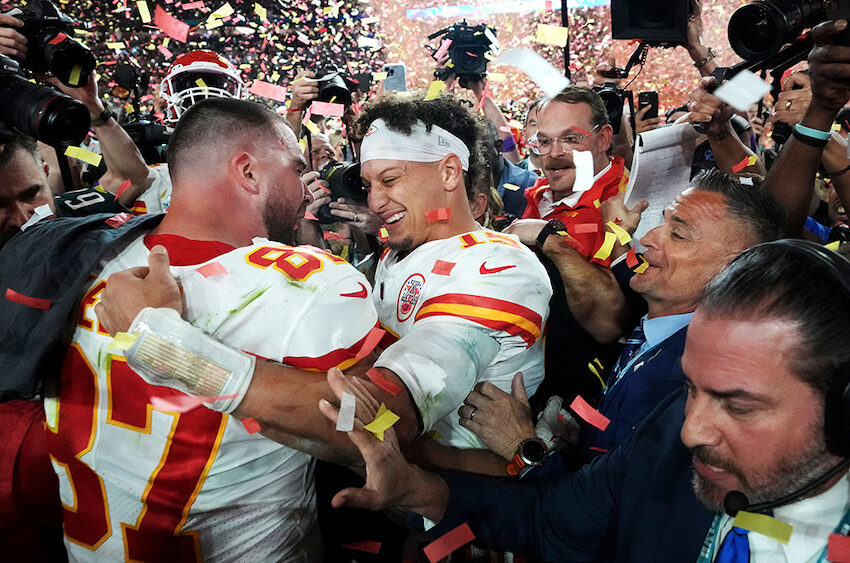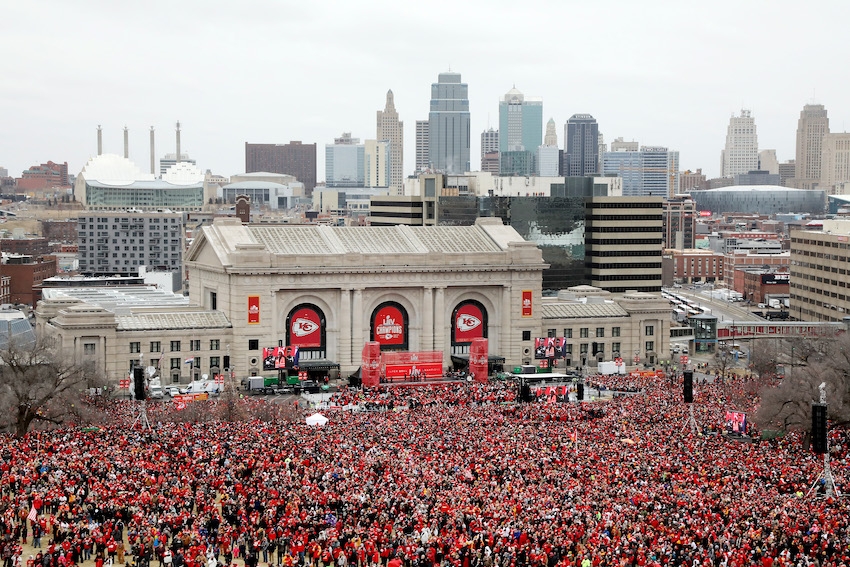What’s an NFL dynasty worth to Kansas City? By Kevin Helliker.
Above, thousands of fans surround Kansas City Union Station to celebrate the Chiefs winning the 2020 Superbowl.
A victory in Sunday’s Super Bowl would give the Kansas City Chiefs their third title in five years, conferring upon them a status rarely achieved in any sport: Dynasty.
Besides bragging rights, however, what’s in it for Kansas City, my hometown?
That question goes to the heart of an age-old economics debate about professional sports teams: Are they givers or takers? Do the benefits they bring to their home cities compensate for their use of public services and, in many cases, public subsidies? Given the pressure local executives face to double as civic leaders, it’s a debate maybe worth following. For every community that deems a team too expensive to keep, there’s always another community eager to open its purse strings.
Even in sports-crazy Kansas City there’s a debate about whether to extend by 40 years a 3/8-cent sales tax earmarked for the Chiefs and Royals, the city’s Major League Baseball team. Approved by 53% of voters in 2006, according to Marquette University’s Sports Facility Report, that windfall is set to expire in 2031—except that voters on April 2 will decide whether to extend that 3/8-cent tax for 40 years.
Ahead of that vote—and ahead of Sunday’s Super Bowl—the Chiefs on February 1 released a report, prepared by a Philadelphia economic consulting firm, that showed “a total annual economic impact of $993.2 million in the Kansas City region as a result of spending by the Kansas City Chiefs on team and GEHA Field at Arrowhead Stadium operations, as well as ancillary spending from non-local attendees of games and events.”

Kansas City Chiefs players Travis Kelce (left) and Patrick Mahomes celebrate winning the Superbowl LVII in February 2023.
“You can put a dollar amount to the substantial economic impact of the Chiefs; however, the power of the team to unite people in a shared sense of community is priceless,” Joe Reardon, CEO of the Greater Kansas City Chamber (and a former Kansas City mayor) said in a press release. “The team is a significant element of our community’s DNA—a unifying factor that brings people together through a collective identity as Chiefs Kingdom.”
Once a center of meatpacking, manufacturing and transportation, Kansas City has transformed itself over the decades into a hub of finance, life sciences, technology and entertainment—particularly sports. In recent decades, while the Chiefs and Royals stadiums anchored the eastern portion of the metropolitan area, new NASCAR and Major League Soccer stadiums helped revitalize the western portion. Opening downtown next month will be the first stadium built by a National Women’s Soccer League team and notably, it is touted as the first in the world built expressly for female athletes. A minority owner of the Kansas City Current women’s professional soccer team, by the way, is Brittany Mahomes, wife of Chiefs superstar Patrick Mahomes and herself a former college soccer player.
Having visited Kansas City with regularity for 40 years—besides family visits, I covered the city for The Wall Street Journal—I sense that the Chiefs have made a significant, if not entirely measurable, contribution to the city’s renaissance, especially during the Mahomes era. For better-informed insights than mine, I contacted a long-time source, Christine Kemper, founder of the marketing firm Kemper & Company and member of a family long prominent in Kansas City banking, entrepreneurialism and philanthropy.
“Our girls were starstruck,” says Kemper of a visit to their school by Brittany Mahomes and players for the Kansas City Current soccer team.
“How do you measure the value of the visibility the Chiefs bring to the city?” Kemper mused. “My husband recently flew to the United Arab Emirates on business, and because his company is global, the person he was meeting didn’t know exactly where he was headquartered. When Sandy said ‘Kansas City,’ the person he was meeting in Abu Dhabi said, ‘Chiefs!’”
Kemper is taking no public position on the April 2 vote. But she could not be happier to talk about the Chiefs and philanthropy. “Charitably, the Chiefs are everywhere,” Kemper says, and she would know. Besides her family’s historical commitment to local philanthropy (as evidenced by, among other legacies, the Kemper Museum of Contemporary Art), roughly six years ago Christine founded KC Girls Preparatory Academy, a non-profit public school serving girls in historically segregated neighborhoods.
Patrick Mahomes’ personal foundation has honored and contributed to the school, as has the Kansas City Current. Recently, some of the Current’s soccer players, along with Brittany Mahomes, paid a visit, contributed soccer equipment and a cash donation. “Our girls were starstruck,” says Kemper, “and that’s just one of many ways the teams have touched the community.” She notes that another local educational nonprofit serving the underprivileged, Operation Breakthrough, has received significant donations from Chiefs tight end Travis Kelce, more famous now as the boyfriend of megastar Taylor Swift.
One mystery is whether winning begets community support, or whether community support begets winning. In the last 10 years, Kansas City has won a World Series title (2015) and two National Football League trophies (2020 and 2023). A Super Bowl win on Sunday might help persuade voters on April 2 to approve a long extension of that sales tax subsidy.




